Workers need to know that oil companies have lied to them for years; the elites imagine a world at four degrees warming is acceptable; that a just transition for fossil fuel workers is affordable. Patrick Bond joins Paul Jay on theAnalysis.news.
TRANSCRIPT:
Paul Jay
Welcome to theAnalysis.news. I’m Paul Jay. This is part two of my discussion with Patrick Bond.
This is a congressional hearing on the morning of October 28. It’s a little clip where the Chairman of the, or Chairwoman, I should say of the committee, has five of the CEOs of the main fossil fuel companies. She’s reaming them on the fact that their former leaders lied to Congress when they said they didn’t know or that the climate science was quite definitive and catastrophic. Anyway, it speaks for itself.
Here it is.
Excerpt
“Ms. Watkins, do you agree climate change is a threat to our existence?”
“Chairwoman, I agree that climate change is one of the biggest challenges that we have in the world today, which is why at Shell, we’re in action on providing lower and no carbon products to our customers. We believe this is something we’re all in together. We need to work in collaboration with society, with governments, with other companies and other industries.”
“Do you agree that it’s an existential threat? Yes or no? Yes or no?”
“I agree that this is a defining challenge for our generation. Absolutely.”
“Well, let me put it another way. Does anyone on the panel disagree with the statement from the United States and the Defense Department that climate change is an existential threat to our existence? Does anyone disagree? So the truth is clear. Climate change is real. Burning fossil fuels is the primary cause of this crisis, and it is urgent that we fix it. This is the first time each of you has told Congress this and the companies that you represent, and it is significant and important. Thank you.”
“But it’s also true that if it weren’t for the actions of the big oil companies, we might have taken action to fix this problem decades ago. Mr. Woods, I want to ask you about some public statements that your predecessor, Lee Raymond, made in 1996 and 1997 as the world was debating an agreement to reduce greenhouse gas emissions known as the Kyoto Protocol. Here’s what Mr. Raymond said in 1996, “Currently, the scientific evidence is inconclusive as to whether human activities are having a significant effect on the global climate.” And I’d like to place his statement in the record without objection. And this was no slip of the tongue. In 1997, he gave another speech where he denounced the effects in Kyoto and said, “The case for global warming is far from airtight.””
“Mr. Woods, when Exxon CEO made these remarks about the inconclusive nature of the scientific evidence, were they consistent with the views of Exxon’s own scientists?”
“Yes, Chairwoman, thank you for the question. I appreciate the opportunity to address that. Our understanding of the science has been aligned with the consensus of the scientific community as far back as 20 years ago when you referenced our Chairman, at that time’s comments, and as science has evolved and developed, our understanding has evolved and developed as has our work and position on the statement.”
“Well, as you make your statement, I’m reminded of another hearing that we had with the tobacco industry, and we had all the executives seated in this room, and they were asked about their statements from their companies that the science was uncertain, and they said they did not believe that nicotine was addictive. Well, it came out that they lied. Tobacco nicotine was very addictive. And now I’m hearing from you that the science that was reported publicly where your executives were denying climate change, we know that your scientists internally were saying that it’s a reality.”
“So I was hoping that you would not be like the tobacco industry was and lie about this.”
Paul Jay
I think if we can show this exchange to workers that vote for [Donald] Trump and if they get two or three things, one that the fossil fuel companies were lying, outright lying to them all these years. And lying to them about the catastrophic future their own kids are going to face.
Two, if they get this point, we were talking about earlier that this economist [William] Nordhaus amongst the elites. They actually can imagine a world that warms up by the end of the century to four degrees and think that’s okay. Because as I said, they don’t care about the poor anywhere in the world, including in West Virginia.
And three with the messaging of just transition. And I spoke to a friend of mine who was organizing in West Virginia for years, in fact, recently ran for Congress there on a progressive green agenda. And she says she doesn’t think the vast majority of the workers in West Virginia have ever heard the argument about just transition, that it actually means subsidizing their wages, so they don’t lose in the transition. She doesn’t think any of them actually have ever heard this.
I think there’s a real possibility for that kind of organizing breakthrough. And so we don’t get paralyzed by this upcoming doom and really focus, whether you’re in a city or West Virginia, it doesn’t matter where you are. It doesn’t matter what organization you belong to. Get organized.
Patrick Bond
Well, that’s right. And, Paul, your point that there’s an infrastructure requirement, which is a resource base, especially for the kind of offices and staff salaries and funding to get out and around into rural West Virginia, into all over the U.S. and all over the world, that if I think back to 12 years ago or so, 2009, many of the big funders that you’d normally expect to be quite engaged with, supporting genuine outreach from the mass-based organizations or new movements. They really decided on a different approach in 2009. You might even remember there was a cap and trade. Waxman-Markey was the legislation, and they put $200 million, $200 million in 2009 dollars into the nonsense of trying to promote a carbon trading solution. These are all the kinds of center and center-left funders.
Now there were a few outliers, kind of a Wallace Global Fund or Rockefeller Brothers. There were a few that would sort of think more, in a more visionary way and think, well, climate justice is coming up that should be the grassroots base, the people of colour, youth, labour community links. There was a bit of a vision, but it was completely outweighed by the total waste of money because it failed and also the lack of vision from the centrist Climate Action Funder.
So a climate justice perspective is needed. Without those resources, you have to acknowledge the climate justice movement hasn’t done very well. It launched itself really around 2000. It really came out of not only African American organizing in the United States against toxic dumping, the environmental justice movement in the 1980s.
In the 1990s, much of the momentum had shifted to places like Ecuador Place, Quito, the capital where Acción Ecológica, A visionary Group working with ecofeminist values across the Andes, across Latin America with increasingly groups like Jubilee South and Oil Watch really pushed for climate justice and a big conference in 2000 launched it. We had one in Durban in 2004 at the Bali United Nations meeting in 2007. It’s a real breakout because of the groups that were more on the sort of grassroots sea and Left and serious environmental justice and feminist and youth people of colour. They said, no, we need a Climate Justice Now movement.
So that got up and running, and you will still see sometimes under the rubric. For example, Glasgow demands climate justice, a small but very spirited network of activists. And they do go inside, but they keep an ear on the outside. They do that division of labour of insider-outsider as well as I think, can be done. And that’s the real dilemma on how to build their forces because they are there. What you’re looking for, Paul, and West Virginia, is there. There are mountaintop removal critics. There are critics of black lung disease. There are critics of the power structure that gets a Joe Manchin in, right. And those Democratic grassroots environmental community labour movement activists across the likes of West Virginia just need that extra amount of solidarity, and sometimes also infrastructure support from visionary funders. A few of them are there, but obviously, you’re right. We need those big resources to flow into organizing at the base.
And I think a lot of the electoral mistakes where so much of the tendency with just two parties in the U.S. is to move to the center, to be afraid of climate, to look at the [Ronald] Reagan Democrats, the Trump voters, white blue-collar with all kinds of baggage of racism and sexism. But to just fail to appreciate the possibility of class connecting to a different way, a just transition, a different way of organizing their lives instead of outmoded coal, dying coal fuels, deindustrialized sites and then, of course, opioids.
So obviously, there’s got to be something better. And I happen to myself, grow up in a place in Northern Alabama. Huntsville, Alabama, where I spent some of my youth, where I could really relate to those extreme contradictions, the Democratic Party, controlled by Liberal identity politics and sort of woke and often corporate neoliberal elite that just doesn’t really think they want the votes or the presence in a way in their party. It may be then that the third party, the New Workers Party, all sorts of visions have emerged over the years, not just there, but also in South Africa, something very different, something beyond the existing structure of electoral parties.
But I do agree, I think, with Naomi Klein’s perspective on a Blockadia that’s got to come from these militant exercises of power, the solidarity that goes with it. And then the big consciousness movements, the civil rights movements, as you put it. And there are some grounds for hope. I mean, I certainly, three years ago wouldn’t have expected not just Greta Thunberg, but all of those constituents in the youth to make Fridays For Future, or the British Extinction Rebellion, or German Ende Gelände where they go to the coal mines, and they just stop for brief periods the coal apparatus. And now in the U.S. Sunrise. Plus Extinction Rebellion shutting down parts of Manhattan recently. These are great to inspire us to think.
Paul Jay
As we speak, there’s a hunger strike going on by Sunrise activists outside of the White House. As of today, they’re in their 8th or 9th day, and they’re starting to feel the health consequences, and they’re determined to try to create pressure on [Joe] Biden to actually live up to his promises.
Patrick Bond
Well, more than that, they may not succeed because Biden is obviously shrinking his promises and absolutely failing on all fronts. But what they’re also doing is telling those who’ve gone before them, some of them have been completely admirable. I have no complaints with the likes of 350.Org and all of those, let me say, set-piece arrests at the White House. There was something that Jane Fonda and Annie Leonard led with Greenpeace that was a Friday fire drill effort to continually get arrested in Capitol Hill.
More power to all of those, but now I think it is time to step it up to a much higher level of militancy, and that’s obviously hunger strikes. But I think it’s also going to be taking some of what we do in the armchairs. I’m an academic armchair activist in too many ways, and I’d love to be out in the trenches if we could get them going. Maybe COVID will be relaxed at some point to allow that. But, for example, that would entail where pipeline activists, the water defenders of Minnesota. Well, all over the world, people are understanding that clean water is under threat from the extractivism of fossil fuels.
And it does strike me that now we’re nearly ready to put this together as a global movement. It would be a very different movement than what kind of Al Gore and his climate action people have been putting together insider lobbying, trying to use ideas to persuade nothing wrong with that. But you can see how far it gets in today’s testimony. The ideas were already there in Exxon’s internal think tanks. And look what they did with them. They just suppressed them because there’s no political street heat to make those ideas catch fire.
Paul Jay
Okay, well, we’ll do another whole interview, maybe get somebody from West Virginia in on it with us and some of the other places where people are organizing because I think that—
Patrick Bond
Mike Roselle did such good work doing the mountain top removal. [Julia] Judy Bonds was formidable before her death in organizing that base. So we do have examples, I mean, Anne Braden in Kentucky, that Southern U.S. has rich seams of activists who could connect the dots and think about a kind of ecosocialist, feminist, anti-racist politics in practice—
Paul Jay
I would like to stop using all those words. If you think those words are going to play to the vast majority of workers in West Virginia, forget about it.
Patrick Bond
But they do. In a place like South Africa, where our capitalism has resulted in the most unequal country—
Paul Jay
Hold on. The political sophistication of the working class of South Africa is like a different planet compared to most of the United States. South African working class, at least the urban working class, is very political and very sophisticated. Maybe you can talk like that. But I interviewed Adolph Reed the other day, and he’s very strong about this. It doesn’t mean it isn’t right to want climate justice. Of course, it is. And all the issues that have been raised are all just. But it also has to be a politics that’s directly in the interests of fossil fuel workers and other workers who are going to say what’s in it for me. And to expect workers to be primarily worried about people in Ecuador or even people in downtown L.A, well, they’re not going to be. And the issue isn’t here to— the morality of all this, the issue is we got to win.
Patrick Bond
Now the dilemma there, Paul, I’m with you that making an appeal through the just transition, or Green New Deal. We call it million climate jobs, politics. Absolutely right. On the other hand, the word profit, if you don’t like the word capitalism, it has motivated a populist hatred of elites and to take the climate prices—
Paul Jay
I didn’t say don’t use the word capitalism.
Patrick Bond
Yes. When do we name it—
Paul Jay
Well, I answered right away.
Patrick Bond
Well, I think so because, in a place like Glasgow, capitalists will put on display that they have tech fixes, and they have offsets, and they have net-zero gimmickry, and they have all kinds of internal reforms to capitalism to smooth the rough edges. In political economy, we call these internalizing externalities of things that are dumped on the world: pollution, or racism, or sexism. And it’s part of the product to make the product cheaper, but society and the planet take the hit.
And now the dilemma is how much can we do to put a tax, in a sense, make capitalism pay for externalizing all of these costs, and because we can’t do it very well, we don’t have power in any particular state that can do this. We’re really reduced to making an ideological argument, and I think that, in a way, helps us move forward.
There are very few reformers who are really able to show that their carbon markets, that their tech fixes and their various ecological modernization schemes are up to the standard that we demand, which is survival of civilization, and survival of ecology, and preventing a sixth species extinction.
Paul Jay
I do not think you can honestly talk to anybody about the problem and what real solutions look like without dealing with private ownership of, what did they used to say, the commanding heights of the economy. You can’t talk about it honestly, especially when it comes to the issue of climate and fossil fuels. And honestly, I don’t think, especially, anyone under the age of 50 actually gives a shit because—
One of the only things, there were a couple of things I thought [Barack] Obama did that was good amongst 99% of the things I didn’t think he did was good. But right in the last week of the election, when he beat John McCain, McCain started denouncing him as a socialist and trying to bring all the demons of the Cold War mentality into the election because McCain saw himself losing. And Obama, I thought, had a great answer to it. He didn’t get defensive. When he was accused of being a socialist, he said, well, my Bible teaches me I should be my brother’s keeper.
I think one can have this conversation, and in fact, one must have this conversation. Not that Obama was any kind of socialist. Don’t send me any mail. I know he wasn’t.
Patrick Bond
But to take it to the next level because Obama could be everything to everybody at that particular moment in November of 2008. But to take it to the next level, which is, can we figure out a kind or strategize ecosocialist planning? Now we’ve been doing that really well in micro settings under all sorts of rubrics of alternative ways of living, and alternative approaches to agriculture, and to public transport, and to the construction sector, and to renewable energy, and all of the ways we’ve been doing these little pilots don’t unfortunately yet challenge power. They’re really at the margins. We could call it a kind of lemon socialism because they can’t really exist without huge amounts of love and labour, free labour. And let’s call it a kind of a mutual aid system, right? A solidarity economy. An economy of care.
And the dilemma is when we desperately need a state to show us what can be done with ecosocialist planning because the market is and the sort of capitalist planners are clearly unable to grapple with this, that’s going to be the next layer, and it may come in the next months or years. It may come in sites like the Andes, wherein Bolivia there’s a return to the movement for socialism and awareness. Maybe in Ecuador, where there’s a new Left movement that’s grounded in Indigenous and ecofeminist values that may come in the form of revived, furious workers movement in places like I’d never expect the United States. I’m not sure where these movements might emerge from. The progressive international is trying to shape a global social Democratic agenda; it might get traction. So these are still to be determined in the years ahead.
But I don’t think, Paul, that is what capitalism has on offer. What John Kerry and maybe Joe Biden himself will try to bring to Glasgow will be received with gratitude. I think there’s a fury that’s building, and even the comprador, compromised elite African negotiators who go there, we don’t have, for example, a Lumumba Di-Aping. Lumumba Di-Aping was a 2009 Copenhagen Accord critic. He stood up, and he said as the leader of the G77[Group of 77] plus China delegation, he said, “What is Obama going to tell his Kenyan relatives about the value of their lives based on this Copenhagen accord?” which was a trashing of anything that could work on the climate. He said, “African negotiators are lazy, and they’ve been bought off.” He was very honest. He said about South Africa, our delegation, that my tax money spent to go there divided the G77 in the Africa block because we have a sub-imperial kind of layer of interest here of fossil fuels and expansive interests that we weren’t going to pay any climate debt or have any emissions cuts built-in.
So this is the dilemma, do we have truth-seekers? And it’s interesting in the COPs? Three times I’ve seen this with Lumumba Di-Aping in 2009. You might remember Pablo Solón, who was a brave Bolivian, the ambassador to the U.N., and he stood up again and again during 2009 and 2010 and reminded the North they owe a climate debt. He went to Cancun the COP summit right after Copenhagen, and he went there to say, “I object on behalf of the Bolivian people and all of our climate justice movement.” We had a big Cochabamba Bolivia climate justice event in April 2010, and in December, he went, and he said, “I object.” And he was just smacked down.
And then, in 2012, the last case is Yeb Sano. He’s now head of Greenpeace Asia. And Yeb was a Filipino young man whose family was devastated by a big typhoon that had just swept through just before the Warsaw COP. And he went on a hunger strike. Went on very eloquent critiques of what was happening. He wasn’t allowed back in each of these cases; the U.S. put pressure, you can be sure. And this is the dilemma that Kerry is back and Biden’s coming. And they’ve got Jonathan Pershing an old hand at this, and it just reeks of U.S. neoliberal corporate imperialism in Glasgow.
And that, in a way, is useful in the sense that there’s no real need for Greta Thunberg to learn any more words than what she used. Three words, blah, blah, blah. This is what we’re going to be getting from the North over the next couple of weeks as the Glasgow COP26 goes into some sort of paralysis. And the hope is we can put the pressure from below in our various sites here in South Africa. A number of protests have already been planned. Many have been held the last few weeks and really put pressure on negotiators just not to agree to another Paris Climate Agreement, as James Hansen put it, bullshit, fraud and fake, and to really then have an alternative. The alternative, of course, is still to be determined, but definitely, it’s going to be Blockadias: stopping at the point of production, of transport, of consumption, fossil fuels, stop them in the tracks. It’ll be more divestment.
The 14 or 40 trillion, I’ve heard different estimates of the amounts of money that will be withdrawn from the dirty industries. It will be a matter of this big civil rights sensibility that we got with Black Lives Matter in the U.S., the biggest protest wave in U.S. history. It’ll be that sort of movement that I think we’re on the horizon to expect. We need it. I hope we can organize it. Maybe the funders will give some infrastructural support that’s also badly needed.
Paul Jay
So the fossil fuel companies are caught themselves here. One, they can no longer deny the existential threat of the climate crisis. On the other hand, they can’t admit they lied because, amongst other things, I assume it might even create some kind of legal liability for them. You could see a lawsuit. Your lies helped create devastation for the world. Boy, imagine what that class action suit could look like. In fact, people should be thinking about that.
Patrick Bond
And they are.
Paul Jay
And three, they obviously have so much fossil fuel in the ground that they are amongst those elites who believe, as I said earlier in part one, that four degrees is a livable planet if you’re rich enough. And this is me saying obviously putting words in their mouths; we don’t give a shit about poor people all over the world now, why should we care if there’s more of them? But what’s your take, Patrick?
Patrick Bond
Yes, it’s exactly that calculus. When the oil price at $80 at $85 a barrel, or the gas price record highs, and as Europe finds shortages and a cold winter coming, Russia may need to supply more. As the coal price, it went from around $35 to now $230 a ton. Clearly, capitalism is indicating that it makes a lot of money to go and keep those huge reserves of fossil fuels and to dig for more, explore for more. That’s the source of enormous profits. So capitalism is sending all the wrong signals.
But what’s critical here is that these oil and gas and coal companies know what happened in April 2020. They were the leaders in the decline of the value of their product. The price of oil was negative. It kind of was a $20 barrel equilibrium briefly in April, but it was literally negative for some days. And I think the dilemma for an oil company is you’ve got a huge stock market bubble, what we call the Buffett Indicator, the measure of how much of a bubble, that is market capitalization to GDP[Gross Domestic Product]. It’s never been higher. This country has the highest in world history. And I think those are the signals to the managers. They want that stock price up. That’s where they get their bonuses. That’s where they get their own personal accumulation of capital because they have a lot of shares. They’re often given shares and given rewards.
Now the dilemma is we really need to crash those oil companies, those coal companies, those gas companies. And unfortunately, the capitalist system is working against us by valuing their product very high. So we’ve done this moral critique. We’ve told any financial institution with some honour, with some decency, with some foresight, and also perhaps a sense of the insurance costs and their future liabilities that they’re profiting.
I’ll just give you one concrete example of that because just over a year ago, one of our great anti-coal activists was murdered. She was assassinated by three thugs. It was a hit job. It was connected. Everyone thinks, there’s no concrete proof to a coal company. That coal company is expanding in Ohio on Lake Erie. It’s building a big pig iron facility, $475,000,000. But the assassinated activist, her name Fikile Ntshangase, very close to the oldest nature reserve in Africa. A very interesting site called, Hluhluwe-iMfolozi. And the coal company was moving in on her village, and she was opposing it with about 4,000 members of the Mfolozi Community Environmental Justice Organization. And what the lawyers had said quickly right after the assassination is someone has to pay the profits that came from that coal are the incentive to kill the activists. And to continue even into the oldest game park, a place, by the way, where the white rhinoceros was saved from extinction. There were only kind of a few dozen left. And now there are several thousand. That white rhino, the south white rhino, with especially Ian Player and the local communities saved from extinction, but now threatened by this coal mine literally on their doorstep. The coal company wants to move right up to the edge.
And it’s that kind of, let’s say, coalescence of potential forces of conservationism, which is often reactionary and racist here. And environmental justice, NGOs[Non-Governmental Organisations] and community organizations like this one. And they need the disinvestment from this kind of company. They need everyone around the world to look at the company. Look at the banks behind it and say this should be anathema to any investor. Those are the sorts of signals that have to reverberate more powerfully across the system to stop these assassinations. It was just over a year ago, and what we do in the Zulu culture is to reflect upon life and the spiritual need to release that life. And that happened on Friday in the form of protests. Some of the most powerful international speakers I’ve ever seen were online to pay tribute to the struggle of Fikile Ntshangase.
And now the question is, where is our solidarity to make this kind of Blockadia to stop coal companies in their tracks? Fikile Ntshangase had, again and again, stood on the road and blocked coal trucks from taking the coal out. And I think that’s this interesting global-local challenge, right? It’s a challenge to say, where’s our balance?
Let me just use myself as someone who had a frequent flyer card. Where do I pay my climate debt for all of that carbon that I contributed to in a way that builds the struggle? And it would be to MCEJO, which is the Mfolozi Community Environmental Justice Organization. It would be to set up a trust to do what these funders haven’t yet really done properly, which is to really empower these base struggles.
I think that’s one of the ways forward, and I hope the climate debt gets onto the agenda. John Kerry, Jonathan Pershing, your two main U.S. negotiators, certainly the Canadian government, all the E.U.. They desperately don’t want climate reparations to be discussed. They’ve tried to prevent the name for this; partly, it’s called loss and damage. It’s sort of in under the carpet. It’s there. But there’s also the cost of adaptation, and of mitigation, and of resilience. There’s costs associated with compensating countries that don’t use too much carbon, that haven’t used the carbon space that we have in the North. Those are some of the dilemmas, I think.
Paul Jay
With that being said, what do you make of China? But also, Biden saying, okay, we’re not going to fund fossil fuel projects in Africa and other places. I saw a critique of this that says this is kind of smoke and mirrors bullshit because these countries already produce so little fossil fuel. All you’re actually doing is taking potential energy away from them and the countries that are trying to make themselves look good, including China, by saying they won’t fund this stuff anymore. Actually are still building coal plants, and so on that, it wasn’t a real move that actually means anything.
Patrick Bond
I think it could mean something on the grounds that there’s a huge pressure on China to export its coal-fired power plant construction. This is what we call the overcapacity, the over-accumulation of fossil capital. In that sense, I would give credit to Xi Jinping for doing something I didn’t think possible. He’s used the Belt and Road initiative to push the, let’s say, excess capacity that exists in China out.
It’s the way imperialists always are driven. Rosa Luxembourg really nailed this in her 1913 book called Accumulation of Capital. She said, look, there are capitalist crises of overproduction. And what happens, then, is that with overcapacity, the Imperial States need to take over new lands, and that’s where this excess capacity ends up. It’s very clear with not just Chinese coal, but they’ve tried to move some of their steel industry and to move their product and Belt and Road and the infrastructure potential that they have in mind.
So let’s say that there could be something. Let me call it a devalorization of that over accumulated capital to use the Marxist jargon that I learned from David Harvey. In other words, there is a little bit of a write-down involved in this—so full credit where they’re managing the write-down in places like Hebei Province. Of course, they wanted to manage the coal industry’s shrinkage there because of the terrible pollution.
But if you’re in a place like Lamu, Kenya, Paul, which is a coastal town, it’s an old village going back centuries. And suddenly, the Chinese are proposing a big coal-fired power plant to be supplied from South Africa. And the local activists fight back, and the Chinese banks are intimidated, and they pull out. And now Xi Jinping has said, “we won’t do this anymore.” That’s a great victory. And we’re watching this in this country for two reasons.
There is one big coal-fired power plant. It’s 1320 MW, it’s named Musina-Makhado. It’s in a special economic zone. And the kind of dubious Chinese company with a guy wanted by Interpol is running with it. And he says there’s potentially $30 billion worth of new investment from China to make a metallurgical complex if we can get this coal-fired power plant. We think the coffin nail might be in that because of Xi Jinping’s announcement.
But the next question is China is importing coal, and they’ve driven the price up to unbelievable levels. Partly this Australia-China geopolitical battle has meant they’re switching their supply. Including now, much more from South Africa. And that means the transport of our coal that’s inland to the Port, and that’s where Chinese finance and Chinese companies, for example, China South rail financing locomotives, highly corrupt, connected to the Gupta family, the notorious family that bribed and cajoled Azuma leadership, the family there.
And that’s one of our great dilemmas, how do we link into China in a way that says you’ve got some very dirty financing and very dirty companies and all of this rhetoric that you’re different than the Western imperialist because you’re bringing us the forces of production. You’re not interventionists. You’re not neocolonial manipulators. Actually, you are because Chinese capital is doing some of the worst things, including fossil fuels, but also all the other corrupt investments.
So I’m a little bit more optimistic, Paul, than you are. What I hope it will do is extend not just to qualified power plants, but to coal mining, to coal transport, to coal import. That’s where we really need the Chinese to be serious, and it looks like they’re kind of desperate. They’ve got a major financial calamity with the real estate market crashing. They’ve had to turn off huge chunks of industry because of their energy shortages. It’s a difficult situation for Xi Jinping to manage all of this, to keep varieties of oppression across the Chinese, not only in the heartland and in the periphery of China, but now also in the expanded areas of the South China Sea. The potential for conflict with India that’s already unfolding on the border, but also in Kashmir. I wouldn’t recommend anyone take the job Xi Jinping has as a leader for life because there are problems for life.
Paul Jay
All right, well, thanks for joining us, Patrick. And we’ll pick this up again after the Glasgow meetings and see whether anything has changed.
Patrick Bond
We must. And the last point, because you have so many great viewer communities in different sites where there are European and U.S. and Canadian and Australian, Japanese, Saudi Arabian, and South African, BRICS embassies and consulates and high commissions. Let’s be out during this period. We don’t only need to go to Glasgow. We need to be out protesting this conference of polluters and make very clear to the elites that we disrespect what they’re coming up with in Glasgow. And we’re going to have our own strategy starting at the base, starting with mass movements, starting with big consciousness-raising, that things have to be very different in future.
Paul Jay
All right, thanks very much, Patrick.
Patrick Bond
Thank you
Paul Jay
And thank you for joining us on theAnalysis.news. Again, please don’t forget the donate buttons. If you don’t donate, we can’t do this. Subscribe if you’re on YouTube, sign up, go to our website, sign up on the email list and make sure you share. Send this link to some people you know.
END
Podcast: Play in new window | Download | Embed
Subscribe Apple Podcasts | Spotify | Android | iHeartRadio | Blubrry | Email | TuneIn | Deezer | RSS
Never miss another story
Subscribe to theAnalysis.news – Newsletter

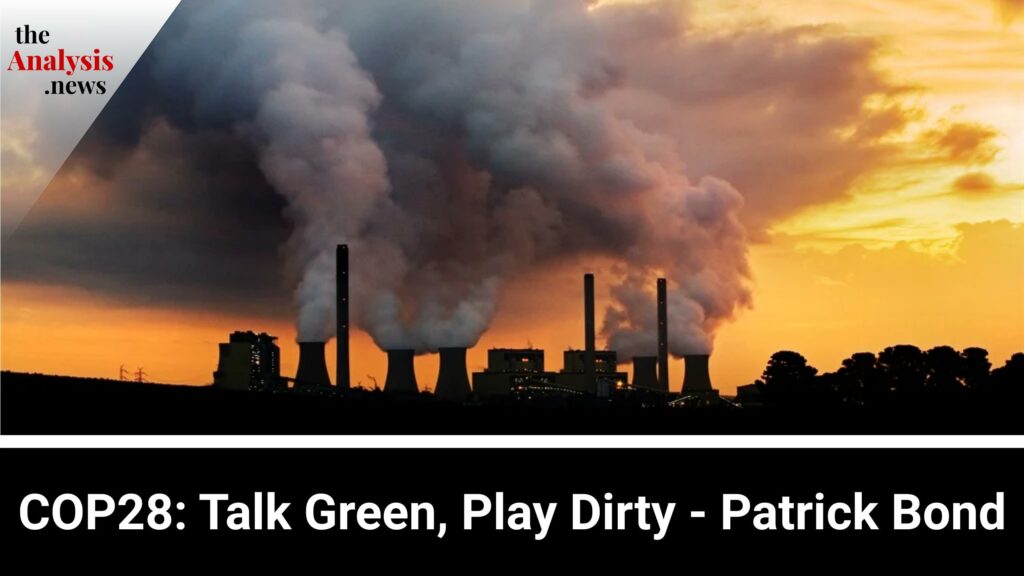

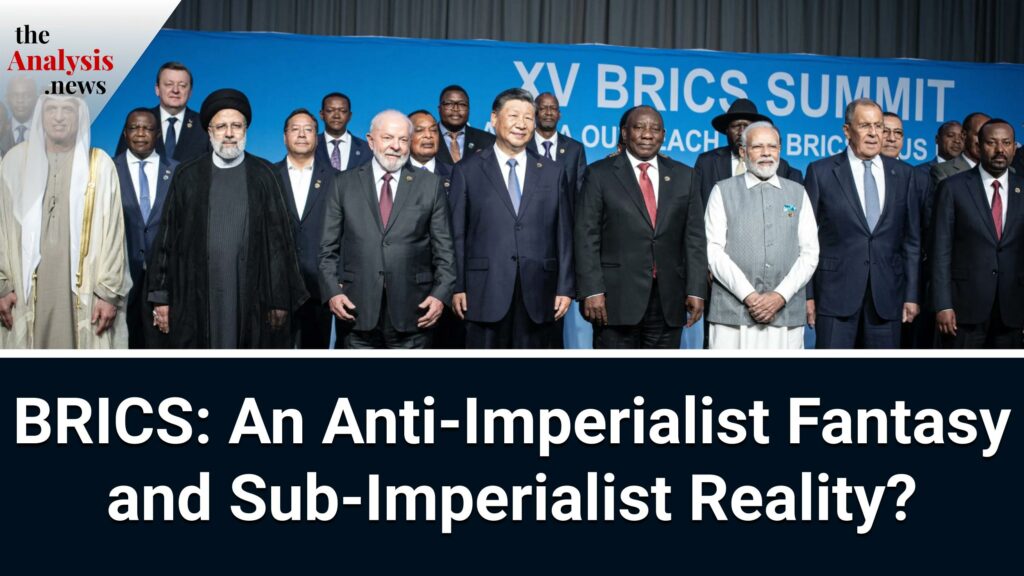
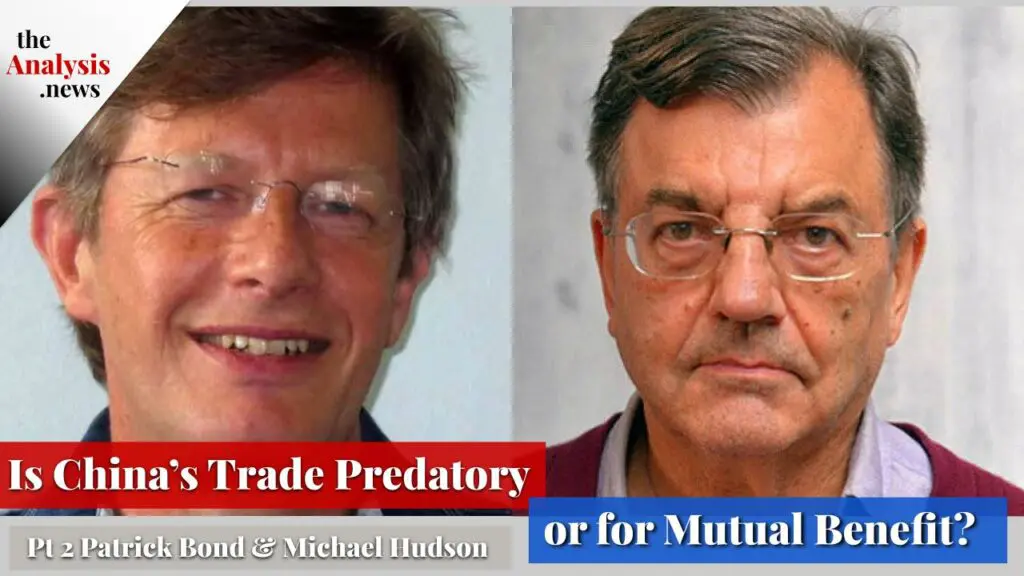

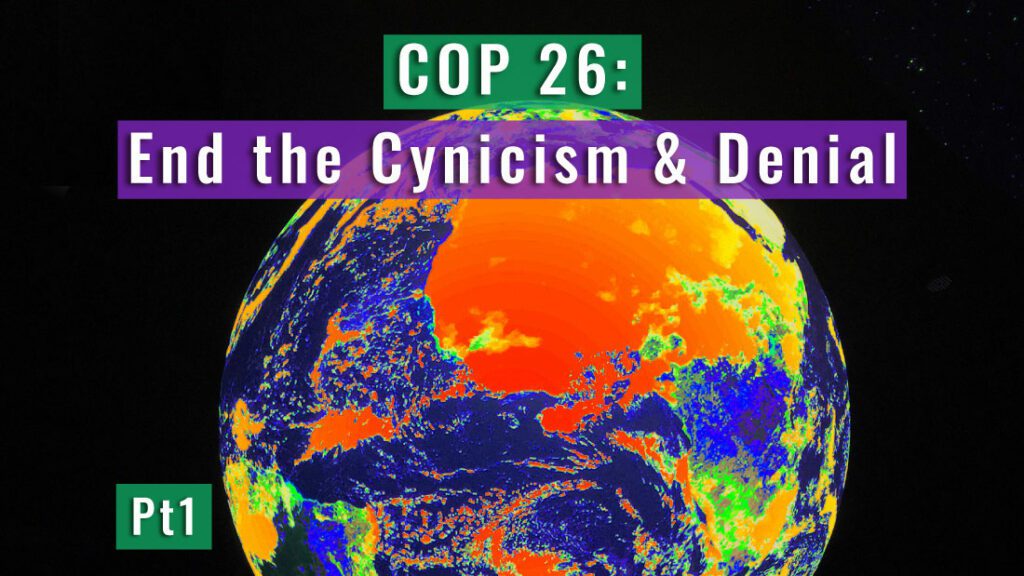

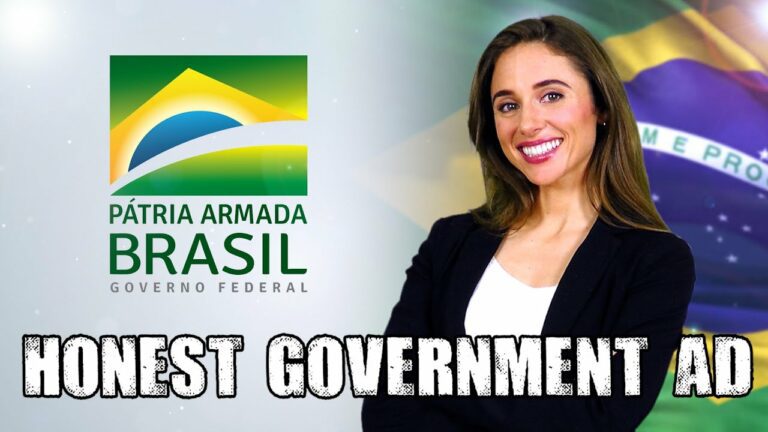
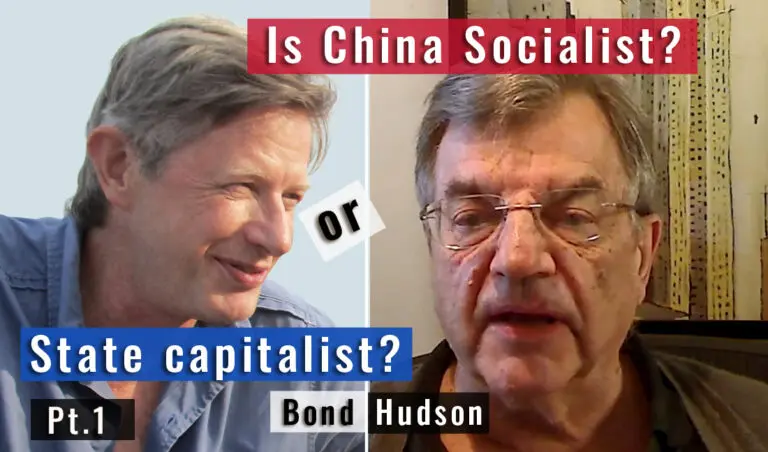
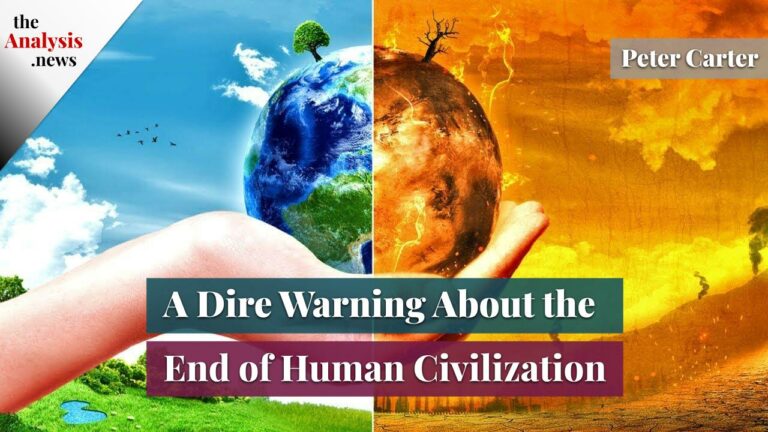


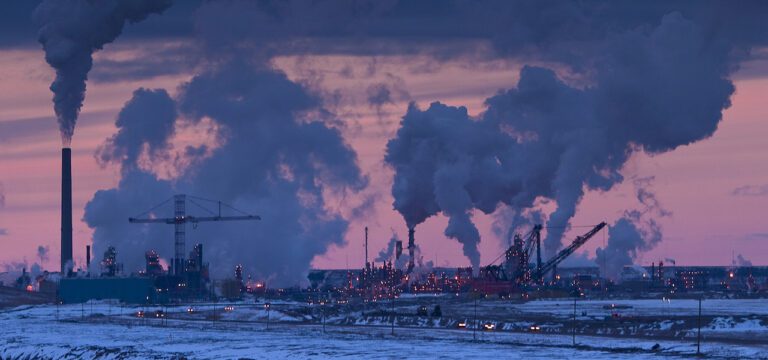
Just read the Nobel Prize lecture of William D. Nordhaus and I think the quotation about a 4 degree rise in temperature being ‘optimal’ is taken out of context. It is a result of one of many models that Nordhaus discusses and there is no reason to suppose that he associates himself with that particular model. Some of the other models discussed constrain temperature rise to a maximum of two degrees. I think it is encouraging that some economists are trying to take climate change seriously, even though they still underestimate its potential costs and do not fully grasp its existential character. I would like to see a serious debate between Nordhaus and an activist climate scientist like Michael Mann, moderated by Paul Jay.